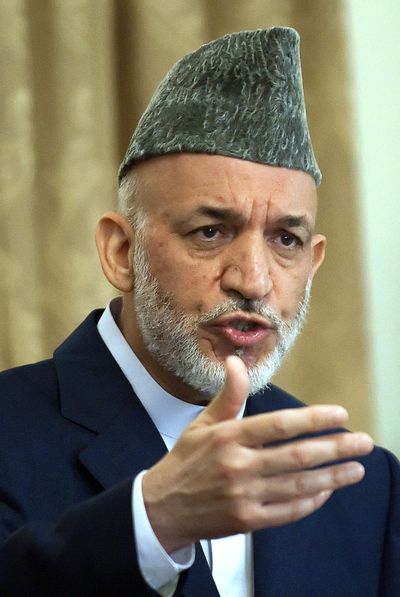Karzai seeks to limit probe in two key investigations
Says graft investigation will be Afghan

Afghan President Hamid Karzai intends to impose rules restricting international involvement in anti-corruption investigations, a move that U.S. officials fear will hobble efforts to address the endemic graft that threatens support for his administration in Afghanistan and the United States.
Karzai wants to circumscribe the role of American and other foreign law-enforcement specialists in two key anti-corruption organizations that have been set up in the Interior Ministry by preventing them from direct involvement in investigations.
“The management will be Afghan, and the decision makers will be Afghan, and the investigators will be Afghans,” Mohammed Umer Daudzai, Karzai’s chief of staff, said in a telephone interview Wednesday. Foreign advisers, most of whom work for the U.S. Department of Justice, will be limited to “training and coaching, but not decision making,” he said.
Concern about Karzai’s willingness to root out corruption has emerged as a flashpoint in the U.S.-Afghan relationship, with American officials arguing that Karzai has not done enough to demand accountability and Karzai maintaining that the problem has been fueled by the influx of billions of dollars in foreign assistance.
The planned changes have alarmed U.S. officials in Kabul and Washington and prompted efforts to persuade Karzai and his advisers to soften the restrictions.
“What he’s proposing would effectively neuter these two bodies,” said a U.S. official involved in Afghanistan policy.
Daudzai said Karzai also plans to prevent the U.S. government from influencing the selection and augmenting the salaries of the Afghan investigators and prosecutors who serve in the two organizations.
In June, U.S. officials involved in anti-corruption investigations told the Washington Post that senior officials in Karzai’s government had derailed investigations of politically connected Afghans. “Above a certain level, people are being very well protected,” one senior U.S. official told the Post.
The latest controversy began with the arrest in late July of a presidential aide, Mohammed Zia Salehi, on charges that he solicited a bribe of $10,000 and a new car to impede an investigation into a money-exchange firm that is alleged to have funneled $3 billion in undeclared cash out of the country. Reports about the firm and the high-level interference with investigations had earlier prompted the chairwoman of the House subcommittee responsible for foreign aid, Rep. Nita Lowey, D-N.Y., place a hold on $3.9 billion in U.S. reconstruction funds for Afghanistan.
The case against Salehi was assembled by the Interior Ministry’s Major Crimes Task Force and the Special Investigative Unit. Although they are part of the Afghan government, both bodies have received extensive support from a team of U.S. law enforcement advisers in Kabul who work for the FBI, the Drug Enforcement Administration and other arms of the Justice Department.
U.S. officials said the advisers have provided vital support to the two Afghan organizations, including access to wiretaps and other intelligence data. The U.S. advisers also help the Afghans assemble cases and conduct raids.
U.S. officials insist that the Afghan leaders of the organizations make the final decisions about which cases to pursue, and they have sought to do so without being swayed by political considerations.
But Karzai’s advisers believe that U.S. officials have de facto control over the organizations. “There is suspicion that the international partners have a decision making role,” Daudzai said. “That is unacceptable.”
Another U.S. official familiar with the issue said the planned limits on U.S. involvement could have a significant impact on the ability of both bodies to conduct the sort of anti-graft work that the Obama administration deems essential. Partnership, the official said, has been “an essential feature of these institutions.”